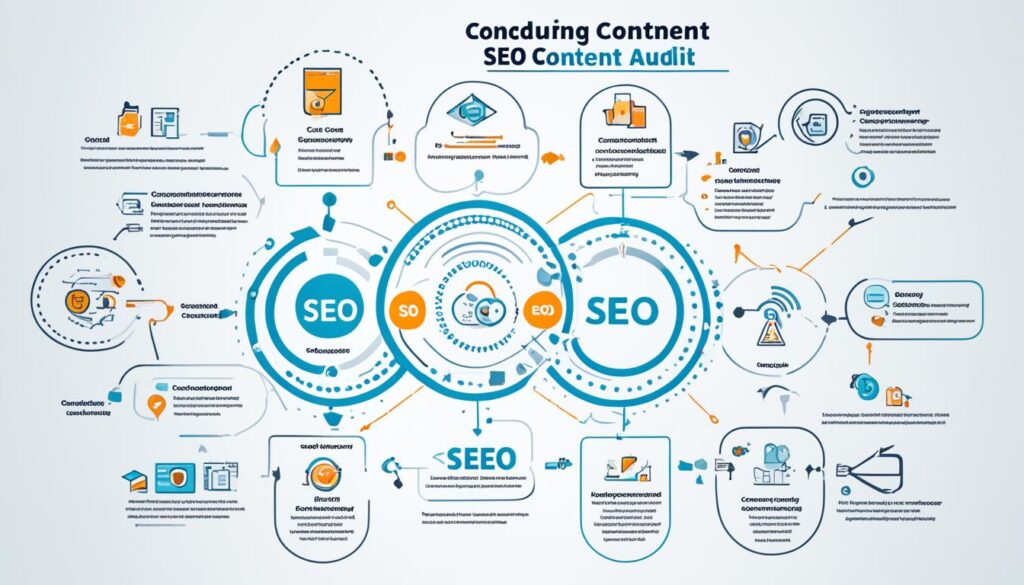
Welcome to my step-by-step guide on conducting an SEO content audit. In this comprehensive guide, I will walk you through the process of optimizing your website's content to boost your search engine rankings and attract more organic traffic.
Key Takeaways:
- An SEO content audit is crucial for maximizing your website's potential.
- Regular audits help identify areas for improvement in your content strategy.
- Conducting a content audit involves several steps, which we will explore in detail.
- By optimizing your content, you can achieve better search engine rankings and increased organic traffic.
- Start conducting your SEO content audit today and unlock the full potential of your website.
Understanding the Importance of an SEO Content Audit
An SEO content audit is a crucial process for optimizing your website and improving its performance. By analyzing your content and identifying areas for improvement, you can align it with your target audience and search engine algorithms. This ensures that your content is relevant, high-quality, and properly optimized, ultimately boosting your search engine rankings and attracting more organic traffic.
The importance of an SEO content audit cannot be overstated. It allows you to evaluate the effectiveness of your content strategy and make data-driven decisions to optimize it further. By conducting regular audits, you can stay updated with the latest trends, preferences, and algorithms in the ever-evolving digital landscape. This enables you to identify any issues or gaps in your content and take corrective actions promptly.
"An SEO content audit is like a compass that guides your content strategy in the right direction, ensuring it remains relevant and competitive in the online realm." – Michelle Johnson, SEO Specialist
One of the primary benefits of an SEO content audit is the ability to assess the relevance of your content. By understanding what your target audience is searching for and what topics are currently trending, you can tailor your content to meet their needs. This helps you capture their attention, engage them, and position yourself as a valuable resource in your industry.
Moreover, an SEO content audit helps you evaluate the quality and effectiveness of your content. It allows you to identify any duplicate or thin content, optimize your metadata and headings, and ensure that your keywords are strategically placed. By improving the overall quality of your content, you can enhance its visibility and user experience, resulting in increased engagement and conversions.
By conducting regular SEO content audits, you can uncover opportunities to optimize your existing content and identify gaps that can be filled with new, relevant content. This helps you stay ahead of the competition and maintain a strong online presence. Additionally, optimizing and updating your existing content signals to search engines that your website is active and committed to providing valuable information to users.

A well-executed SEO content audit can be a game-changer for your website's performance. It allows you to continuously improve your content strategy, attract more organic traffic, and achieve better search engine rankings. So, start conducting regular SEO content audits today and unlock the full potential of your website.
Steps to Conducting an SEO Content Audit
Conducting an SEO content audit is a systematic process that ensures your website's content is optimized for maximum search engine visibility. By following these steps, you can evaluate and improve your content strategy to drive organic traffic and boost your website's overall SEO performance.
Step 1: Define Your Goals and Objectives
Before conducting an SEO content audit, it's crucial to establish clear goals and objectives. Determine what you want to achieve with your audit, whether it's improving search engine rankings, increasing organic traffic, or enhancing user engagement. Having a clear direction will guide your audit process and help you prioritize areas for improvement.
Step 2: Identify the Key Pages and Content
Next, identify the key pages and content on your website that are critical for achieving your goals. These may include high-ranking pages, landing pages, or important blog posts. By focusing on these key pieces of content, you can ensure that your audit efforts have maximum impact.
Step 3: Evaluate On-Page SEO Factors
Assess the on-page SEO elements of your content, such as title tags, meta descriptions, headers, and keyword usage. Optimize these elements to align with your target keywords and improve search engine visibility. Additionally, analyze the overall readability and structure of your content, ensuring it is engaging and user-friendly.
Step 4: Analyze Content Relevance and Quality
Determine the relevance and quality of your content by assessing its usefulness, accuracy, and up-to-date information. Remove or update outdated content that no longer serves its purpose, and identify gaps in your content strategy that need to be addressed. Aim to provide valuable and informative content that meets the needs of your target audience.
Step 5: Assess Keyword Optimization
Analyze how well your content is optimized for target keywords. Ensure that keywords are strategically placed throughout the content, but avoid keyword stuffing that may harm your search engine rankings. Optimize your content with relevant keywords to improve its visibility and increase organic traffic.
Step 6: Review Internal and External Links
Evaluate the internal and external links within your content. Check for broken links and redirect them to relevant pages. Review your link building strategy to ensure it aligns with best practices and supports your SEO goals. Additionally, consider incorporating internal links to boost the visibility of important pages within your website.
Step 7: Monitor User Engagement Metrics
Analyze user engagement metrics, such as bounce rate, time on page, and click-through rates. These metrics can provide valuable insights into how well your content is performing and whether it is meeting user expectations. Use this data to identify areas for improvement and optimize your content accordingly.
Step 8: Create an Action Plan for Optimization
Based on the findings of your SEO content audit, create a detailed action plan for optimization. Prioritize the areas that require immediate attention and outline specific tasks that need to be completed. Assign responsibilities to team members and set measurable goals to track your progress and ensure ongoing improvement.
By following these steps for conducting an SEO content audit, you can optimize your website's content strategy and drive organic traffic. Regularly review and update your content to stay ahead in the ever-evolving world of SEO and maintain your website's competitive edge.

| Step | Description |
|---|---|
| Step 1 | Define your goals and objectives for the audit. |
| Step 2 | Identify the key pages and content on your website. |
| Step 3 | Evaluate on-page SEO factors. |
| Step 4 | Analyze content relevance and quality. |
| Step 5 | Assess keyword optimization. |
| Step 6 | Review internal and external links. |
| Step 7 | Monitor user engagement metrics. |
| Step 8 | Create an action plan for optimization. |
Conclusion
Conducting an SEO content audit is a vital and ongoing process for optimizing your website's performance. By regularly reviewing and optimizing your content, you can improve your search engine rankings, attract more organic traffic, and enhance your overall SEO performance.
Following the step-by-step guide outlined in this article, you can systematically evaluate and improve your content strategy. By assessing the relevance, quality, and optimization of your content, you can ensure that it aligns with your target audience and search engine algorithms.
Start conducting your SEO content audit today to unlock the full potential of your website. By consistently reviewing and optimizing your content, you can stay ahead of your competitors, attract more organic traffic, and achieve better search engine rankings. Take the first step towards boosting your website's SEO performance and maximizing its visibility in search results.
FAQ
What is an SEO content audit?
An SEO content audit is a process of analyzing and optimizing the content on your website to improve search engine rankings and attract organic traffic. It involves assessing the quality, relevance, and optimization of your content.
Why is an SEO content audit important?
An SEO content audit is important because it helps identify issues and areas for improvement in your content strategy. By conducting regular audits, you can optimize your content, attract more organic traffic, and improve your website's overall SEO performance.
What are the steps involved in conducting an SEO content audit?
The steps involved in conducting an SEO content audit include assessing your website's current content, analyzing keyword usage and targeting, evaluating content relevance and quality, optimizing meta tags and descriptions, updating outdated content, and monitoring performance metrics.
How often should I conduct an SEO content audit?
Conducting an SEO content audit is an ongoing process that requires regular review and optimization. It is recommended to conduct audits at least once every six months or whenever there are significant changes in your website's content strategy.
What are the benefits of conducting an SEO content audit?
Conducting an SEO content audit has several benefits, including improved search engine rankings, increased organic traffic, better alignment with your target audience, optimization of content relevance and quality, and overall improvement in your website's SEO performance.
How long does it take to conduct an SEO content audit?
The time required to conduct an SEO content audit depends on the size of your website and the complexity of your content strategy. It can take anywhere from a few days to several weeks to complete a thorough audit.
Source Links
- https://www.hulkapps.com/blogs/shopify-hub/exploring-the-costs-do-you-have-to-pay-for-each-shopify-store
- https://www.hulkapps.com/blogs/shopify-hub/do-you-need-a-business-license-for-shopify-a-comprehensive-guide
- https://www.hulkapps.com/blogs/shopify-hub/the-essential-guide-to-registering-your-shopify-business











